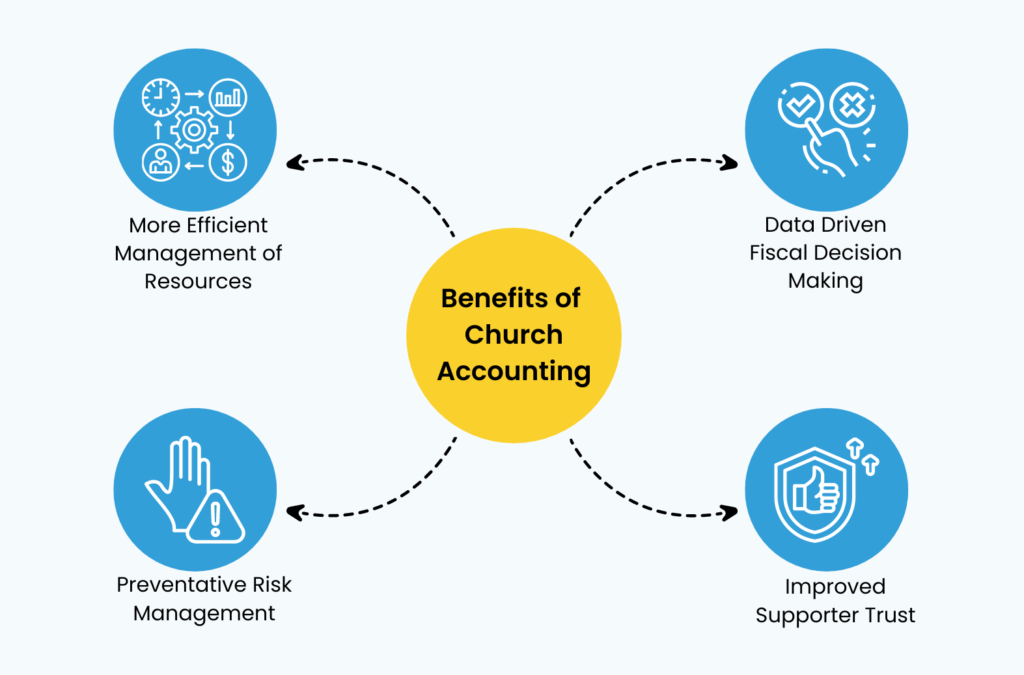
Accounting is a crucial aspect of any organization, whether it’s a church or a business. However, the approach to accounting can vary significantly between these two types of entities. Understanding the differences between church accounting and business accounting is essential for ensuring financial accuracy and compliance with relevant regulations.
If your church is a 501(c)(3) nonprofit, it's important to understand the specific accounting rules that apply to it. While these rules are similar to those for businesses, there are some key differences.
This guide will help you learn about:
If you're not already using accounting software specifically designed for churches, this guide is a valuable resource.
Churches, as non-profit organizations, rely heavily on donations from their supporters. To maintain trust and ensure that funds are used effectively, accountability and transparency are paramount. Churches must demonstrate how donations are invested in their mission and provide clear financial information to their donors.
In contrast, for-profit businesses are primarily driven by the pursuit of profit. Their primary accountability is to their shareholders and investors, and they are generally not required to provide the same level of transparency as non-profits.
Businesses typically use a single general ledger to track all financial transactions. This ledger ensures that the accounting equation (assets = liabilities + equity) remains balanced.
Churches, on the other hand, often use multiple ledgers to track different types of income and expenses. These smaller ledgers are then organized into a church chart of accounts. This approach allows churches to better understand how their funds are being used and to comply with specific accounting standards for non-profit organizations.
An income statement in the for-profit sector details the revenue a company earns over a specific timeframe, showcasing its profitability. In contrast, a statement of activities used by nonprofits highlights the organization’s revenue, expenses, and overall changes in net assets during an accounting period. This statement provides a comprehensive view of how funds are received and utilized, reflecting how well the organization is advancing its mission and fulfilling its purpose.
In the realm of financial reporting, the terminology used for nonprofit organizations differs from that of for-profit businesses. Specifically, what businesses refer to as a "balance sheet" is known in the nonprofit sector as a "statement of financial position."
For-profit companies use a balance sheet to present their financial condition by detailing their assets, liabilities, and equity. This document illustrates how much value shareholders have in the company, showing how assets are financed through liabilities and equity. It helps stakeholders understand their share of the company's profits and overall financial health.
In contrast, a statement of financial position serves a similar purpose for nonprofits, such as churches. Since nonprofits do not have owners or shareholders, there is no equity to account for. Instead, the statement of financial position focuses on the organization’s assets and liabilities, providing a snapshot of its financial status. It details what the organization owns (assets) and what it owes (liabilities), offering insight into its financial stability and capacity to fulfill its mission without referencing ownership equity.

The decision of whether to hire an in-house accountant or outsource accounting services for a church often depends on the church's size and financial complexity.
Larger churches with significant financial needs often find it beneficial to hire an in-house accountant. This provides dedicated support and personalized attention to the church's financial operations. However, this option can be more costly.
Smaller and mid-sized churches frequently choose to outsource their accounting needs. This can be a more cost-effective option, especially for churches that don't require full-time accounting staff to handle their financial matters.
While outsourcing may not provide the same level of personalized attention as an in-house accountant, it offers the expertise of a seasoned professional. An experienced accountant can handle various accounting tasks efficiently and provide valuable guidance on financial matters specific to churches.
When starting a new church, it's easy to overlook the details of how you'll handle finances. But when nobody on your leadership team has accounting experience, you may realize how truly complex this work can be.
The good news is that solid accounting is not out of reach. If you cannot afford a full-time accountant, you can always outsource to a third-party accounting firm. And if you do decide to "keep it within the church," the assistance of a nonprofit treasurer or bookkeeper and a fund accounting software can ensure that your financial health remains up to par!
1. Why is bookkeeping important for churches?
Church bookkeeping is essential for maintaining financial transparency, ensuring compliance with tax regulations, and making informed decisions about resource allocation. It also helps build trust within the congregation.
2. Are churches exempt from taxes?
Most churches in the United States are exempt from federal income tax under IRS Section 501(c)(3). However, they may still be subject to other taxes, such as employment taxes.
3. What tax forms do churches need to file?
Churches typically need to file the following tax forms:
4. How can churches use technology to improve their bookkeeping?
Technology can help churches:
5.What are some common bookkeeping challenges for churches?
Common challenges include managing restricted funds, tracking donor contributions accurately, and ensuring proper documentation for financial transactions.
BookkeeperLive provides affordable bookkeeping and accounting services tailored to your business goals.





No calls, No meetings, No spam. Get started with a free trial by filling out the form.
*NDA included for your data protection.
Copyright © 2025 BookkeeperLive. All rights reserved. Privacy Policy Terms of Use
Please visit our India site to see services designed for your country
Enter the code, fill out the form, and unlock financial clarity with a free trial.